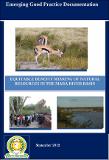Equitable Benefit Sharing Of Natural Resources In The Mara River Basin ii
Author
Date
2012Type
Reportviews
downloads
Metadata
Show full item recordxmlui.dri2xhtml.METS-1.0.item-citation
Equitable Benefit Sharing Of Natural Resources In The Mara River Basin ii
Abstract/
Lack of equitable benefit sharing among stakeholders and countries is one of the main factors that result into ineffective management of natural resources in most river basins in Africa, particularly the transboundary ones such as the Mara River Basin (MRB). Studies indicate that inequitable benefit sharing leads to natural resource degradation, and conflicts amongst societies and Nations. This report presents a documentation of best practices in equitable benefit sharing of natural resources in the Mara River Basin of Kenya and Tanzania, and proposes policy and strategic directions for best practices in equitable benefit sharing of natural resource use that can contribute to sustainable development in the MRB. The study had four specific objectives to: (1) review the policy, legal and institutional environment for equitable sharing of benefits from natural resources; (2) map out relevant stakeholders directly or indirectly concerned with equitable sharing of benefits; (3) identify the best practices applied in equitable benefit sharing; and (4) prepare a policy brief on the best practices on equitable sharing of benefits of the natural resources in the Mara River Basin. The study was guided by the UN Convention (including the Rio summit of 1992) on Biological Diversity (CBD) in which ‘‘fair and equitable benefit-sharing’’ is one of the three objectives. The objective holds that countries, farmers, and indigenous communities that grant access to their natural resources should share in the benefits that users derive from these resources. The objective is an international agreement commonly referred to as The Nagoya Protocol on Access to Genetic Resources and the Fair and Equitable Sharing of Benefits Arising from their Utilization. The study was also guided by East Africa Community (EAC) Protocol on Sustainable Development to which Kenya and Tanzania are signatory as Partner States of the EAC. Both Kenya and Tanzania have also ratified the CBD and have developed National Biodiversity Strategies and Action Plans (NBSAP) to address its requirements.

